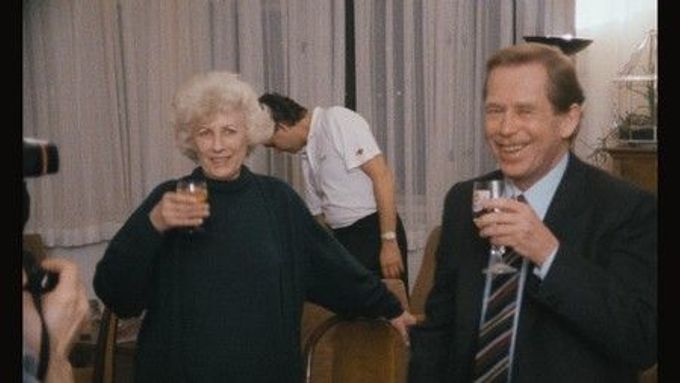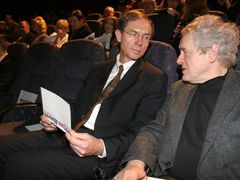Opinion - Anywhere else in the world, such thing is unheard of: as an incumbent president is running for re-election, his predecessor releases a movie ridiculing him. But it happened in the Czech Republic.
The film documentary Citizen Havel opened at a gala premiere on January 30. The feature movie casts the current Czech President, Václav Klaus, in a role of the main villain of the piece and shows him in many a demeaning situation.
In the first round of presidential election on February 8, 2008, Mr Klaus will be defending his office against Mr Jan Švejnar. It's still not clear whether and in which way an attack by movie could influence Mr Klaus's re-election chances in a secret ballot by 281 MPs and senators.
Difficult years with Klaus
The main goal of the film documentary is to present the world as perceived by the hero, Mr Václav Havel and his entourage, during his presidency. The film logically ends with an apotheosis of the former President.
It shows him, admired at the Prague NATO summit by leading politicians and heads of state from around the world. Then, with the Bartered Bride music in the background, he talks to the opera singer Gabriela Beňačková (who played the lead role of Mařenka in a TV adaptation of Smetana's opera).
He tells her about watching it on TV at Heřmanice jail and explains how the music helped him survive.
Up to this moment, mythology surrounding Havel's presidency drives the film. In it, Mr Klaus is presented from the very beginning as a negative character, yet as a Prime Minister in a stronger position than the president. Naturally, Havel keeps mocking him for his lack of culture and points out Klaus only became PM because he catered for the majority petit bourgeois mentality of his voters.
Friends from abroad are helping Mr Havel to survive uneasy co-habitation with Mr Klaus in Prague; to do so, they don't hesitate to play music first the fellow president Bill Clinton, then the Rolling Stones.
Fortunately, help also comes from home-grown politicians such as Josef Lux and, above all, former Social Democrat PM Miloš Zeman who even let himself to be filmed during the talks on forming the government after the 1996 general elections. "Show him it's you the president," he'd prompt Havel against Klaus.
Švejnar too as an ally
The rediscovered courage is manifested at the beginning of 1997 at the villa Amálie in Lány, where Mr Havel and his friends blame Mr Klaus's economy policies for bringing the country into recession. "It is a punishment for their pride, they believed they had a key to economic well-being," he condemns the Civic Democratic Party ODS.
There is a necessarily high price to be paid for introducing market economy and then let the things run on their own steam. Mr Jan Švejnar, the elite economist, nods his head pensively in a circle of consenting friends.
Havel wins the conflict as he humiliates Klaus during his speech at Rudolfinum. "A government collapse is a commonplace thing, not an ancient Greek tragedy," he boasts over the resigning Prime Minister during a speech to both chambers of the Czech Parliament. Mr Klaus is left with but one option: refusal to applaud.
During Havel's second presidential election campaign, Sládek's Republican Party is shown as the main enemy.
They don't spare Havel in their speeches, calling him names such as "destroyer of the nation". Luckily, Mr Zeman, the then leader of the House of Representatives, comes to help, counter-labelling the Republican MPs: Jan Vik he calls consistently "chairman of club of Republican shittizen MPs".
A second struggle, a second victory
Havel had to fight even harder after Mr Zeman joined forces with Mr Klaus to create the so-called "opposition agreement". This became obvious the moment Social Democrat government in cooperation with Civic Democrats put Mr Jiří Hodač in charge of Czech national TV.
TV producers and reporters revolted, seized the TV building and asked for support. "I cannot stay uncommitted when choosing between Good and Evil," Mr Havel declared denouncing in a speech the coalition government parties' desire to control TV and comparing the situation to the 1948 Communist coup.
The documentary then shows Mr Klaus banging his fist at the parliamentary lectern. "Those supporting law-breakers have no place in politics even if they happen to be the head of state," quoth Mr Zeman, equally upset.
This conflict, too, has a successful outcome. Those close to Mr Havel are celebrating ODS defeat in the 2002 election. Havel himself refuses to ask Mr Klaus to form a government preferring the Social Democrat leader Vladimír Špidla.
At the same time he is mocking the longstanding deputy leader of the Parliament, Mr Jan Kasal from Christian-Democrat party who, at the time, tried to resurrect a right wing coalition with Civic Democrats. "It did not work for you, Kasal," the Czech president says.
Then comes a glory of the NATO summit: Havel first condemns the strict security measures surrounding the summit, then meets George Bush.
He's not as intimate with the warrior president as he used to be with Bill Clinton. Given the opportunity, he prefers to talk to Jacques Chirac letting the French President's even flirt with his wife Dagmar.
Politics as marketing
A popular movie sponsored by the Nova TV channel could help Mr Švejnar in his campaign against President Klaus. It's almost certain that such an intervention in the fight for presidential office will make the documentary movie even more popular with the audience.
Next weeks will show which of the following theories is right. One says that artists are still affecting politics through their artistic work; the other claims politics is fast becoming an excellent marketing instrument to sell art.

